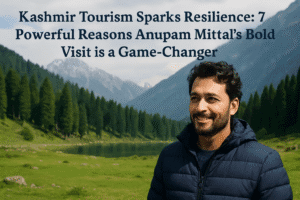Kashmir Tourism Sparks Resilience: 7 Powerful Reasons Anupam Mittal’s Bold Visit is a Game-Changer
Amid rising India-Pakistan tensions and a deadly terrorist attack in Pahalgam that claimed 26 lives, Shark Tank India judge Anupam Mittal announced plans to visit Kashmir, urging citizens to revive tourism as an act of solidarity. Posting flight tickets on social media, Mittal framed travel as resistance: “If we vanish, they win. If we travel, Kashmir & India win.” His stance sparked a wave of support, with netizens applauding his courage to “empower the local economy” during crisis.
The move counters a 62% tourism cancellation rate post-attack, threatening Kashmir’s ₹15,000 crore industry and livelihoods tied to 2.3 crore annual visitors. Mittal’s message—tourism as both economic lifeline and psychological resilience—highlights how public figures can shift narratives of fear. By prioritizing community support over retreat, his visit symbolizes a broader truth: rebuilding trust in conflict zones demands collective action, not isolation. As Kashmir’s stability hangs in balance, Mittal’s call challenges India to choose unity, proving that solidarity, not silence, fosters hope.

Kashmir Tourism Sparks Resilience: 7 Powerful Reasons Anupam Mittal’s Bold Visit is a Game-Changer
In a bold move blending patriotism with economic solidarity, Shark Tank India judge Anupam Mittal announced plans to visit Kashmir amid escalating India-Pakistan tensions, urging citizens to “show up” for the region. His decision, shared widely on social media, has reignited a critical conversation about tourism’s role in fostering resilience during geopolitical strife.
The Catalyst: A Call to Counter Fear with Solidarity
Mittal’s declaration comes just days after a devastating terrorist attack in Pahalgam claimed 26 lives, casting a shadow over Kashmir’s tourism-driven economy. Posting a photo of his flight tickets on X (formerly Twitter), the Shaadi.com founder wrote, “If we vanish, they win. If we travel, Kashmir & India win.” His message, amplified on LinkedIn, emphasized that supporting Kashmiris isn’t about defiance but solidarity: “We stood behind our Army; now let’s stand beside our people.”
The timing is poignant. Recent border skirmishes and a halted ceasefire have left Srinagar’s airport among 32 shuttered nationwide, deepening anxieties. Yet Mittal’s stance challenges the narrative of retreat, framing tourism as both an economic lifeline and a psychological counter to terrorism.
Netizens Rally: “Love the Spirit, Sir”
The public response has been overwhelmingly supportive. Social media users praised Mittal’s “spirit,” with one commenting, “Aptly said. Empower the local economy.” Others echoed the sentiment, calling his trip a catalyst for collective action. This reaction underscores a growing recognition that Kashmir’s stability hinges on visitor confidence—a sector contributing ₹15,000 crore annually pre-2025.
Kashmir’s Tourism at a Crossroads
Before the attack, Kashmir was on track for a record-breaking year, with 2.3 crore visitors in early 2025. However, a LocalCircles survey reveals 62% of families canceled travel plans post-tragedy, threatening livelihoods tied to hospitality, handicrafts, and transport. Over 70% of the region’s workforce depends indirectly on tourism, making this downturn catastrophic.
Mittal’s visit highlights a paradox: While security concerns are valid, abandoning travel plans risks crippling the very communities terrorists aim to destabilize. As one LinkedIn user noted, “Letting fear win dishonors the victims.”
The Ripple Effect of “Showing Up”
Beyond economics, Mittal’s gesture carries symbolic weight. Public figures leveraging their influence to revive tourism can shift perceptions, encouraging everyday travelers to follow. Similar efforts in conflict zones globally—from Rwanda’s post-genocide recovery to Colombia’s peace-driven tourism boom—show how visitor engagement aids healing and deters isolation.
A Path Forward: Responsible Tourism as Resistance
Mittal’s call isn’t merely about booking flights but reimagining tourism as an act of courage. For travelers, this means:
- Prioritizing Safety: Staying informed while avoiding alarmism.
- Engaging Locally: Patronizing family-run hotels, guides, and artisans.
- Amplifying Stories: Sharing positive experiences to counteract fear-driven narratives.
Conclusion: Kashmir’s Resilience is India’s Resilience
Anupam Mittal’s journey transcends a personal trip—it’s a rallying cry for unity. As Kashmir navigates uncertainty, his message reminds us that resilience isn’t passive. By choosing empathy over fear, travelers become stakeholders in peace, proving that solidarity, not silence, is the antidote to division.
You must be logged in to post a comment.